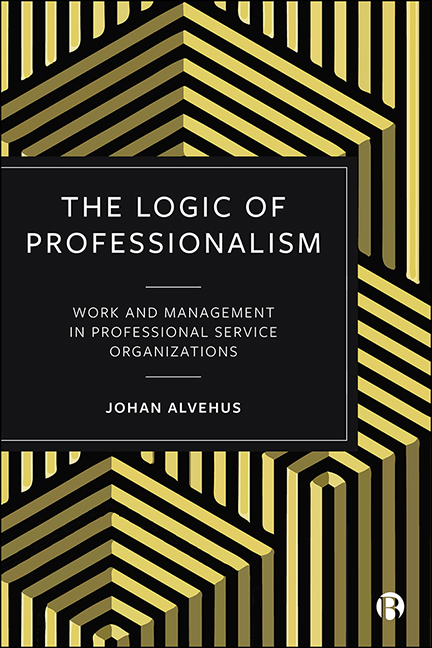Book contents
- Frontmatter
- Dedication
- Epigraph
- Contents
- About the Author
- Preface
- 1 Work in Professional Service Organizations
- 2 Professionalism from an Institutional Logics View
- 3 The Ambiguity of Professional Service Work
- 4 Control, and Control over Control
- 5 The Politics of Leadership
- 6 Superficial Hybridity
- 7 Understanding the Logic of Professionalism
- 8 The Future of Professional Work
- References
- Index
2 - Professionalism from an Institutional Logics View
Published online by Cambridge University Press: 30 April 2022
- Frontmatter
- Dedication
- Epigraph
- Contents
- About the Author
- Preface
- 1 Work in Professional Service Organizations
- 2 Professionalism from an Institutional Logics View
- 3 The Ambiguity of Professional Service Work
- 4 Control, and Control over Control
- 5 The Politics of Leadership
- 6 Superficial Hybridity
- 7 Understanding the Logic of Professionalism
- 8 The Future of Professional Work
- References
- Index
Summary
In the previous chapter, I gave some starting points for the topic of this book regarding professional service work and how such work is managed. In this chapter, I will introduce a few theoretical terms that will reappear throughout the book, and in this I will also point out some caveats with these terms that are perhaps not always apparent. I will to some extent deal with definitions, and definitions are by their nature difficult beasts. On the one hand, we need them in order to know what we are actually talking about. Many concepts in the social sciences have broad use and can thereby become vague: culture, leadership, power, identity, to name but a few. When concepts become too broad and vague, they lose their analytical usefulness, in line with what Geertz (1973) once argued regarding culture: if everything is culture, the term culture no longer helps us to point to something specific and potentially significant.
On the other hand, too precise definitions make us lose sight of what we are looking for. Social phenomena are multifaceted and sometimes ambiguous, and precise definitions risk excluding aspects or instances that might help us learn, or make us see things a bit differently. For example, strict definitions of the term ‘profession’ risk excluding most occupations, leaving very little left to study and also making the definition too far removed from everyday uses of the term. Therefore, the terminology suggested here is best seen as ‘sensitizing concepts’ that ‘suggest directions along which to look’ (Blumer, 1954, p 7). The direction is hopefully clear, yet in empirical instances things will inevitably get a bit blurry.
This chapter takes the form of a discussion between concepts around professions and professionalism, and the abstract theory of institutional logics. I start off by discussing the term ‘profession’, and recognize a need for a more detailed way of discussing the characteristics of professionalism. In order to develop this I first engage with the theory of institutional logics, drawing on Freidson's (2001) framework, to set the stage for a more distinct discussion of professionalism and its relation to markets and bureaucracy.
- Type
- Chapter
- Information
- The Logic of ProfessionalismWork and Management in Professional Service Organizations, pp. 12 - 29Publisher: Bristol University PressPrint publication year: 2021



